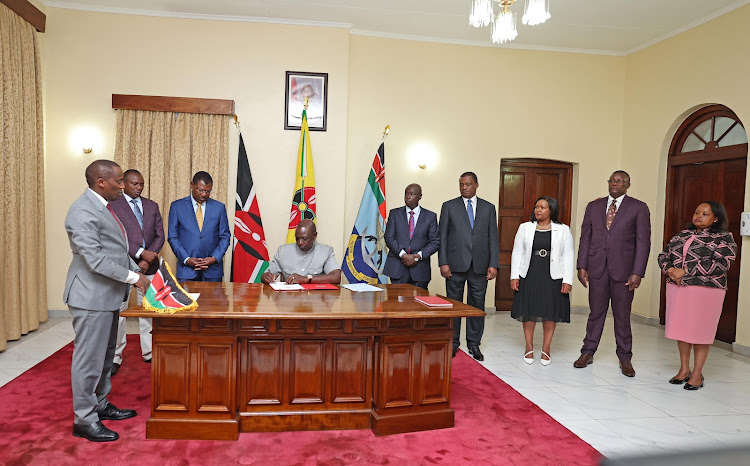What You Need To Know About Privatization Bill Signed By President Ruto
- President Ruto signs Privatisation Bill at Kisumu lodge.
At the Kisumu State Lodge on Monday, President William Ruto gave his approval to the Privatization Bill.
The President will convene a Cabinet meeting in Kisumu State Lodge while visiting the counties of Kisumu and Siaya in the Nyanza region, according to a dispatch from State House.
The President will dedicate the MV UHURU II at the Kisumu Shipyard, Kisumu Central Constituency, about 11 a.m.
Later in the day, he will begin work on the Bondo-Liunda Road in the Bondo Constituency.
In order to speed up the clearance process for the sale of government assets, the Privatization Bill modifications would empower the Treasury to waive Parliament’s right to approve the sale of State-owned businesses.
The government recently announced plans to sell several State-owned businesses through the Nairobi Securities Exchange (NSE) this year, which coincides with the introduction of the State-backed Bill.
Ruto promised that his administration will list between six and ten companies through initial public offerings (IPOs), and he urged the private sector to do the same to help the Nairobi Stock Exchange grow.
The Privatisation Authority will think about privatization through initial public offerings (IPOs) with the agreement of the Cabinet Secretary for Treasury Njuguna Ndung’u.
This strategy attempts to increase openness and transparency in disposals as well as transactions that come from the use of pre-emptive rights.
In these circumstances, the charter documents of the entity govern the process and allow firm shareholders the right to purchase shares at the time of issuance with the first option.
The 2005 law’s specified techniques, including leasing and liquidation, were not included in the new Bill.
In accordance with the suggested amendments, the Treasury Chief Secretary will nominate members of the Privatisation Authority without consulting Parliament, giving the exchequer a bigger say in how the organization is administered.
According to the Privatization Act of 2005, the National Assembly must approve all appointments made by the Treasury Cabinet Secretary to the Privatization Commission following a competitive selection procedure.
The Kenya Pipeline Company, the Kenya Ports Authority, the Kenya Tourist Development Corporation, the Consolidated Bank, the Development Bank of Kenya, and the Agrochemical and Food Corporation are among the 25 firms the Privatization Commission has lined up for state divestment.
State millers like Chemilil Sugar, South Nyanza, Nzoia, Miwani, and Muhoroni are also on the list of struggling companies.
What You Need To Know About Privatization Bill Signed By President Ruto

